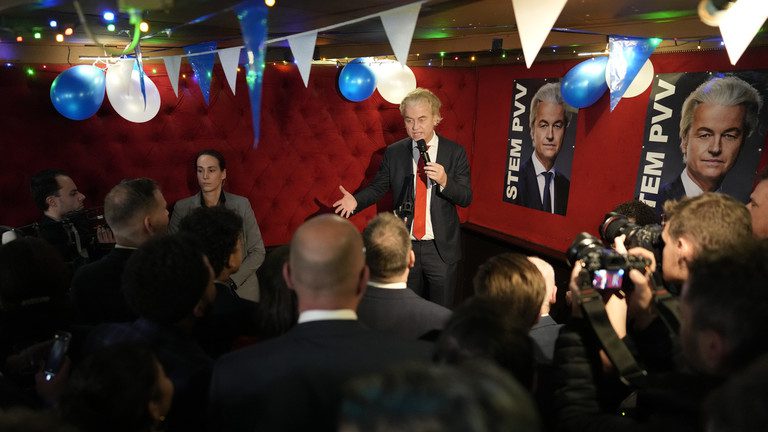Headlines
Geert Wilders, known for his anti-Islam stance, achieves a resounding victory in the Dutch election

With nearly all ballots counted, veteran anti-Islamic populist leader Geert Wilders has emerged victorious in the Dutch general election.
His Freedom party (PVV), which has been in parliament for 25 years, is expected to gain 37 seats, far more than his closest opponent, a left-wing coalition.
“The PVV can no longer be ignored,” he stated. “We will govern.”
His victory has rocked Dutch politics and will undoubtedly stun the rest of Europe.
Nevertheless, he will need to convince other parties to form a coalition with him in order to carry out his promise to serve as “prime minister for everyone”. His goal is to gain 76 of the parliament’s 150 seats.
On Thursday, in a room full of TV cameras, partygoers toasted and applauded Mr. Wilders, 60, during a party meeting.
In order to become prime minister, he “of course” said to the BBC that he would be prepared to bargain and make concessions to other parties.
After capitalising on the general dissatisfaction with migration, the leader of PVV triumphed by vowing “borders closed” and postponing his pledge to outlaw the Koran.
During his victory speech, he was a confrontational man, saying, “We want to govern and we will govern.” [The seat numbers are] both a great honour and a great responsibility.”
Prior to the election, the three major parties refused to support a government led by Wilders due to his extreme right-wing views. But given the magnitude of his triumph, that might alter.
Predictions based on 94% of the vote showed that the left-wing alliance, led by former EU commissioner Frans Timmermans, finished a distant second with 25 seats.
Declaring he would stand up for Dutch democracy and the rule of law, he made it clear he would not support a government led by Wilders. “No one in the Netherlands will be allowed to leave. “Everyone is equal in the Netherlands,” he informed his fans.
That leaves a brand-new party founded by MP Pieter Omtzigt, a whistleblower, in fourth place and the third-placed center-right liberal VVD, led by new leader Dilan Yesilgöz. Both parties have congratulated him on the outcome.
Ms. Yesilgöz says it is up to her party colleagues to determine how to respond, even if she doubts Mr. Wilders will be able to locate the numbers he needs. She was adamant prior to the election that she would not participate in a cabinet headed by Wilders, but she did not rule out collaborating with him should she win.
Initially declaring that his party, the New Social Contract, would not collaborate with Mr. Wilders, Mr. Omtzigt now states that his party is “available to turn this trust [of voters] into action.”
BBC
